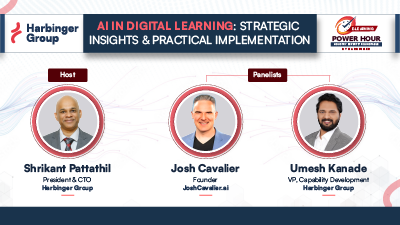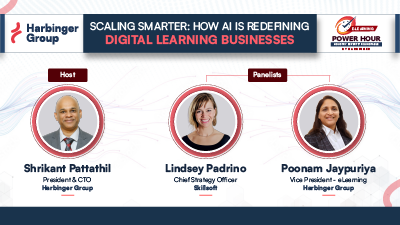
Virtual Reality to Skill, Upskill and Reskill the Workforce of Future
Critical thinking and problem-solving are the top two skills that have been identified as a necessity to navigate the workplace of the future. According to a recent report by the World Economic Forum, self-management skills such as active learning, resilience, stress tolerance, and flexibility are among the emerging skills that are the most sought after, post-pandemic. To address these emerging needs employers have had to shift their goalposts when it came to hiring. This has resulted in a massive skill gap across various industry sectors. And, if we bring in remote work to the mix, the situation becomes even more complicated.
Virtual Reality (VR) has been around for a while. It has mostly been used to improve technical competencies and hard skills. It is now time to stretch beyond that and leverage this technology in a more holistic manner.
In this Harbinger’s EdTech Power Hour, a one-of-its-kind virtual roundtable, where we will explore this relevant theme with leaders from the industry and academia. These experts have shared their perspectives and experiences on taking advantage of VR to Skill, Upskill, and Reskill the workforce of the future. Let us find out more about the adoption of VR as an effective educational tool in the higher education space.
Key Takeaways
- Evaluate the role of VR in developing soft skills
- Define integration of VR into mainstream education
- Identify levers for implementing a scalable VR solution
Critical thinking and problem-solving are the top two skills that have been identified as a necessity to navigate the workplace of the future. According to a recent report by the World Economic Forum, self-management skills such as active learning, resilience, stress tolerance, and flexibility are among the emerging skills that are the most sought after, post-pandemic. To address these emerging needs employers have had to shift their goalposts when it came to hiring. This has resulted in a massive skill gap across various industry sectors. And, if we bring in remote work to the mix, the situation becomes even more complicated.
Virtual Reality (VR) has been around for a while. It has mostly been used to improve technical competencies and hard skills. It is now time to stretch beyond that and leverage this technology in a more holistic manner.
In this Harbinger’s EdTech Power Hour, a one-of-its-kind virtual roundtable, where we will explore this relevant theme with leaders from the industry and academia. These experts have shared their perspectives and experiences on taking advantage of VR to Skill, Upskill, and Reskill the workforce of the future. Let us find out more about the adoption of VR as an effective educational tool in the higher education space.
Key Takeaways
- Evaluate the role of VR in developing soft skills
- Define integration of VR into mainstream education
- Identify levers for implementing a scalable VR solution




